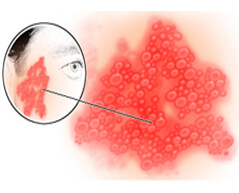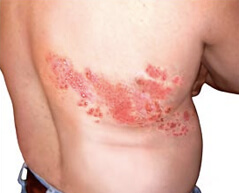Post-Herpetic Neuralgia
 Postherpetic neuralgia (post-her-PET-ic noo-RAL-jah) is a complication of shingles, which is caused by the chickenpox (herpes zoster) virus. Most cases of shingles clear up within a few weeks. But if the pain lasts long after the shingles rash and blisters have disappeared, it's called postherpetic neuralgia.
Postherpetic neuralgia (post-her-PET-ic noo-RAL-jah) is a complication of shingles, which is caused by the chickenpox (herpes zoster) virus. Most cases of shingles clear up within a few weeks. But if the pain lasts long after the shingles rash and blisters have disappeared, it's called postherpetic neuralgia.
Postherpetic neuralgia affects your nerve fibers and skin, and the burning pain associated with postherpetic neuralgia can be severe enough to interfere with sleep and appetite. The risk of postherpetic neuralgia increases with age, primarily affecting people older than 60. The area affected also makes a difference. When shingles occurs on the face, for example, the likelihood of postherpetic neuralgia is significantly higher than for other parts of the body.
Currently, there's no cure for postherpetic neuralgia, but there are treatment options to ease symptoms. For most people, postherpetic neuralgia improves over time.
Post-herpetic neuralgia is a persistent nerve pain that occurs at the site of a previous attack of a condition called shingles.
It's estimated that up to one in every five people with shingles will go on to develop post-herpetic neuralgia, and older people are particularly at risk.
The pain can improve after a few months and medication can help control it in the meantime, although some cases are more persistent and can even be permanent.

Planning your medical trip to India is a very simple process with Spine and Neuro Surgery Hospital India
- You just need to fill in our enquiry form and one of our executive will contact you soon.
- +91-9325887033 Call us at the given to contact number for any assistance.
- Complete information regarding surgery is provided on our website.
In post-herpetic neuralgia, the varicella zoster virus (the virus that causes chickenpox and shingles) damages nerves under the skin of the affected area.
It is not clear why some people with shingles develop post-herpetic neuralgia, but increasing age, pain in the early (prodromal) stage of a shingles attack and severe pain throughout an episode of shingles are all associated with an increased risk of the condition.
The main symptom of post-herpetic neuralgia is continuous nerve pain in an area previously affected by shingles. The pain has been described as burning, stabbing, shooting, aching or throbbing.
The affected area may also:
feel intensely itchy be more sensitive to pain than usual (hyperalgesia) feel painful as a result of something that would not normally hurt (allodynia), such as a light touch or a cool breeze
Living with post-herpetic neuralgia can be very difficult, as it can interfere with your ability to carry out certain daily activities, such as dressing and bathing, and can lead to further problems such as extreme tiredness (fatigue), sleeping difficulties and depression.
Many people with post-herpetic neuralgia make a full recovery within a year of developing the condition. But occasionally the nerves do not heal completely and symptoms last for several years or permanently.
 Medication can ease the symptoms of post-herpetic neuralgia, although they may not relieve the pain completely.
Medication can ease the symptoms of post-herpetic neuralgia, although they may not relieve the pain completely.
As post-herpetic neuralgia generally doesn't respond to standard painkillers such as paracetamol and ibuprofen, alternative medications will need to be prescribed.
These will often be medications originally intended to treat depression (antidepressants) or epilepsy (anticonvulsants), but have since been found to also be effective in relieving nerve pain.
There is no definite way to prevent post-herpetic neuralgia. However, antiviral medication will often be given early during an episode of shingles to help reduce the risk of complications such as post-herpetic neuralgia.
Alternatively, you can reduce your risk of post-herpetic neuralgia by having the shingles vaccination to try to prevent an attack of shingles occurring.
Postherpetic neuralgia (also termed PHN) is a condition of recurring or persistent pain in an area of the body that has undergone an outbreak of herpes zoster virus (HZ), commonly termed shingles. It usually begins after shingles lesions (blisters) begin to crust over and heal but may occur in some patients who do not produce lesions. Some investigators suggest the pain has to be present for three months to be termed PHN.
The signs and symptoms of postherpetic neuralgia are generally limited to the area of your skin where the shingles outbreak first occurred - most commonly in a band around your trunk, usually on just one side of your body.
Signs and symptoms may include:
Pain. The pain associated with postherpetic neuralgia most commonly has been described as burning, sharp and jabbing, or deep and aching.
Sensitivity to light touch. People who have postherpetic neuralgia often cannot bear even the touch of clothing on the affected skin, a condition called allodynia.
Itching and numbness. Less commonly, postherpetic neuralgia can produce an itchy feeling or numbness.
Weakness or paralysis. In rare cases, you might also experience muscle weakness or paralysis if the nerves involved also control muscle movement.
Once you've had chickenpox, the virus that caused it remains in your body for the rest of your life. As you grow older, the virus can reactivate. Sometimes this occurs when your body is stressed - because of another infection or due to medications that suppress your immune system, for example. The result is shingles. Because you have some immunity against the virus, rather than getting a full body rash, the rash occurs in areas of skin supplied by the nerve where the virus is reactivated.
Postherpetic neuralgia occurs if your nerve fibers are damaged during an outbreak of shingles. Damaged fibers aren't able to send messages from your skin to your brain as they normally do. Instead, the messages become confused and exaggerated, causing chronic, often excruciating pain that may persist for months - or even years.
Hospitals such as hospital in Nagpur provide specialized treatment for Neuro treatment. The cost of surgery is comparatively quite low in Spine and Neuro Surgery Hospital.
Get Low Cost Post-Herpetic Neuralgia Treatment in India
We offer free assistance to international patients to find best medical treatment in India. We offer low-cost, world-class medical treatment in India, coordinated by a team of experienced service industry professionals
Please post a query to know about low cost treatment options at top India hospitals
Click Here
